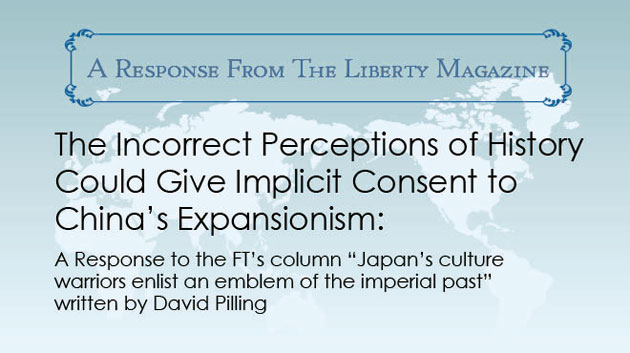The Incorrect Perceptions of History Could Give Implicit Consent to China’s Expansionism:
A Response to the FT's column “Japan's culture warriors enlist an emblem of the imperial past" written by David Pilling
The Financial Time’s column “Japan’s culture warriors enlist an emblem of the imperial past”, written by David Pilling appeared on August 17th, contained some mistakes on the historical issues.
The column appeared to be based on the perception that Japan ‘invaded’ Asian countries and that the revision of the Japanese constitution could lead to militarism. It revealed those unspoken messages when it stated, “…compared with 48 percent and 35 percent respectively in the Philippines and Indonesia, countries that also suffered the brutality of Japanese invasion.”
However, were these facts correct? As it is said in the chief editor’s column,
“When the war ended in 1945, the Dutch and British armies returned to Indonesia, and they intended to continue their colonial rule. The Indonesian people rose up in a war of independence in which 2,000 Japanese men took part in a volunteer army. After four and a half years of fierce fighting, Indonesia was able to smash 350 years of colonial rule.
One of the leaders in this war for independence, former Information Minister Bung Tomo, said:
“The Japanese Army utterly overwhelmed the Americans, British, Dutch, and French before our very eyes. When we saw the weakness and shame of the whites, all the people of Asia gained confidence in the army and knew that independence was near. Once you have self-confidence, it can never be destroyed. Right from the start, The Greater East Asian War was our war, and we had to fight it. (…) In spite of that, we let Japan shoulder the entire burden, and we pushed it to the brink of destruction. That was inexcusable.”
When he visited Japan as a special envoy with Indonesian President in the 1990s, former General Alamsya criticized the Murayama Statement as follows:
“Japan’s objective in the war was to overthrow colonialism. That objective has largely been achieved, but (colonialism) still remains in South Africa and Asia. Having made the Murayama statement, at such a time, meant the abandonment of that cherished vow to overthrow colonialism. (…) Prime Minister Murayama should have condemned the colonialism that still exists.”
How is it possible to point out Japan’s advancements in Asia before re-examining Britain’s colonialism? That was more brutal than that of Japan’s if you believe the above statement from the special envoy General Alamsya.
It’s crucial to re-examine history up until the Second World War for the Asia’s stable future. Of course, It’s shameful that the Japanese government has not yet issued any new statements, which would declare the Murayama and Kono statements invalid, although many of the Japanese pundits have already said they are baseless because both of them had been written without any investigation into the evidence.
Right now, China has made advances in the East and South China Seas. Amid this environment, the incorrect perceptions of history could give implicit consent to China’s expansionism and might bring insecurity to the East and South Asia.
Hanako Cho
Senior Editor



















